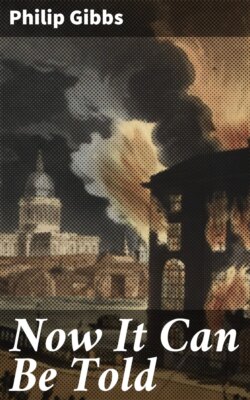Читать книгу Now It Can Be Told - Philip Gibbs - Страница 14
На сайте Литреса книга снята с продажи.
VIII
ОглавлениеTable of Contents
The Commander-in-Chief—Sir John French—received us when we were first attached to the British armies in the field—a lifetime ago, as it seems to me now. It was a formal ceremony in the chateau near St.-Omer, which he used as his own headquarters, with his AD C.'s in attendance, though the main general headquarters were in the town. Our first colonel gathered us like a shepherd with his flock, counting us twice over before we passed in. A tall, dark young man, whom I knew afterward to be Sir Philip Sassoon, received us and chatted pleasantly in a French salon with folding-doors which shut off an inner room. There were a few portraits of ladies and gentlemen of France in the days before the Revolution, like those belonging to that old aristocracy which still existed, in poverty and pride, in other chateaus in this French Flanders. There was a bouquet of flowers on the table, giving a sweet scent to the room, and sunlight streamed through the shutters … I thought for a moment of the men living in ditches in the salient, under harassing fire by day and night. Their actions and their encounters with death were being arranged, without their knowledge, in this sunny little chateau. …
The folding-doors opened and Sir John French came in. He wore top-boots and spurs, and after saying, “Good day, gentlemen,” stood with his legs apart, a stocky, soldierly figure, with a square head and heavy jaw. I wondered whether there were any light of genius in him—any inspiration, any force which would break the awful strength of the enemy against us, any cunning in modern warfare.
He coughed a little, and made us a speech. I forget his words, but remember the gist of them. He was pleased to welcome us within his army, and trusted to our honor and loyalty. He made an allusion to the power of the press, and promised us facilities for seeing and writing, within the bounds of censorship. I noticed that he pronounced St.-Omer, St.-Omar, as though Omar Khayyam had been canonized. He said, “Good day, gentlemen,” again, and coughed huskily again to clear his throat, and then went back through the folding-doors.
I saw him later, during the battle of Loos, after its ghastly failure. He was riding a white horse in the villages of Heuchin and Houdain, through which lightly wounded Scots of the 1st and 15th Divisions were making their way back. He leaned over his saddle, questioning the men and thanking them for their gallantry. I thought he looked grayer and older than when he had addressed us.
“Who mun that old geezer be, Jock?” asked a Highlander when he had passed.
“I dinna ken,” said the other Scot. “An' I dinna care.”
“It's the Commander-in-Chief,” I said. “Sir John French.”
“Eh?” said the younger man, of the 8th Gordons. He did not seem thrilled by the knowledge I had given him, but turned his head and stared after the figure on the white horse. Then he said: “Well, he's made a mess o' the battle. We could've held Hill 70 against all the di'els o' hell if there had bin supports behind us.”
“Ay,” said his comrade, “an' there's few o' the laddies'll come back fra Cite St.-Auguste.”
